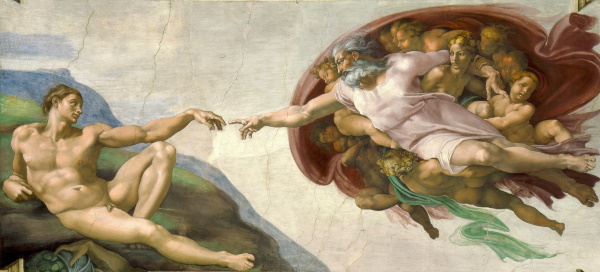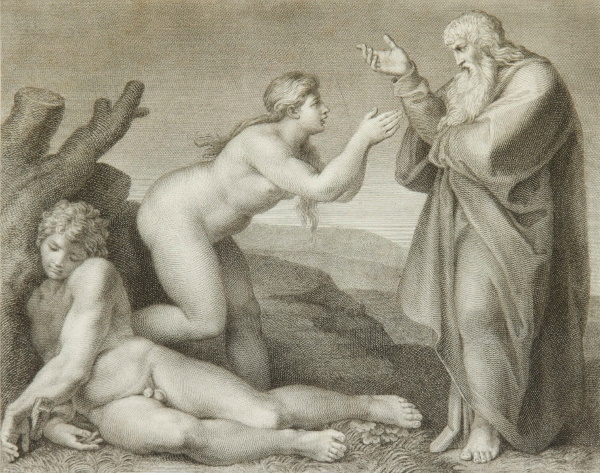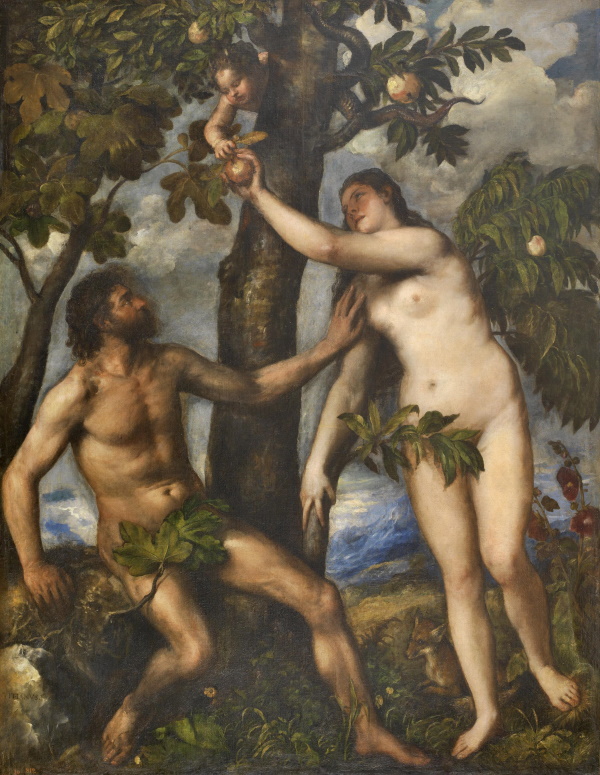Genesis
During my attendance at the Alpha course a couple of decades ago, I was repeatedly reassured that what I was being told was "the word of God", and on asking how we knew that, I was reminded that "it said so in the Bible". On pressing the point by enquiring how we could be confident of the Bible's veracity, it was emphasised that the contents of the Bible had been transmitted directly from God himself (or words to that effect). A clear instance of Petitio principii, m'lud.
But I wouldn't dream of dismissing the enduring majesty and inspirational value of the Bible simply because it had been defended so well-meaningly but ineptly. The Old and New Testaments are the respective bedrocks of Judaism and Christianity, and I understand that both are sympathetically referenced in the Islamic tradition. And untold millions of people much wiser and more learned than me have looked upon them with the greatest respect and reverence for several millennia.
I certainly can't accept everything said in the Bible, but I certainly don't dismiss it all either. I'd just like to focus briefly on the first few chapters of the Book of Genesis, probably the most intensively disputed in the whole of the Old Testament. If you'd like to discover more about the Bible in its entirety, I'm sure you could do much worse that consult Wikipedia for starters or even better The Bible from Scratch, quicker and funnier but no less serious.
Perhaps we could laugh at the sometimes rather comical grammar and quirky syntax (or maybe semantics) of the KJV (especially in the earlier Books in the Old Testament), plus endless repetition of detail in the first two chapters of Genesis. But I spent several decades in the IT department of a major Anglo-American petrochemical company and, believe me, many of my IT and engineering colleagues were far less literate, and made far less sense in their inarticulate emails, than the writers of Genesis.
But Genesis was (I think) not written from scratch, let alone dictated by God; it would have been, at some point, transcribed from an oral tradition, in the same way as were the Iliad and the Odyssey. Remember that people in the millennia BC lived much more outdoor lives than we do, and were far more aware of the majesty of the heavens (the firmament), and the grandeur of the terrestrial scenery, or the ocean, than we are today. And they inevitably turned to their tribal elders for some sort of explanation of where all this, and indeed they themselves, had come from. Over many generations, the first tentative imaginings became (to a certain extent) sharpened and fine-tuned, and were, in due course, to form the substance of the first four recorded chapters of Genesis.

The Ancient of Days setting a Compass to the Earth,
frontispiece to copy K of Europe a Prophecy
God (aka Urizen) measuring-up the Void prior to the Creation
(as imagined by William Blake)
Just as an adult shouldn't laugh at a child's attempts to make sense of its immediate surroundings, we today shouldn't mock early Judaism's attempts at an explanation of the world (indeed, the universe) around it – would we have done any better if (bereft of modern insights) we had been put in their position? And do you know of any better creation myth from the dawn of human curiosity?
These texts are so repetitious and narratively discontinuous that it's unhelpful to exegesise them line by line; an overall summary serves them much better.
Note that biblical days were reckoned from sunset to sunset, rather from midnight to midnight as per the modern (western) convention.
God creates the Earth and the visible cosmos, in six stages (days)
#1 He creates light, plus day and night
#2 He creates the firmament (sky), plus rainfall and terrestrial waters
#3 He creates the seas and dry land, plus grass and fruit-trees
#4 He creates the sun, moon, and stars, to reckon the passage of time
#5 He creates fish and fowl
#6 He creates terrestrial animals, plus Man and Woman, all to be vegetarian!
And on the seventh day (Sabbath) he rests; hence the seven-day week
Plants grow above ground, as no rain or tillage
Rain arrives; God creates Man from the earth
He puts Man in charge of the Garden of Eden, where inter alia the Tree of Life and the Tree of Knowledge of Good & Evil flourish
He forbids Adam to eat fruit from the Tree of Knowledge of Good & Evil
He puts Adam in charge of the animal kingdom
He creates Eve from one of Adam's ribs, but no implication of sexuality
Serpent persuades Eve to eat fruit from the Tree of Knowledge of Good & Evil
Eve persuades Adam to eat it too
Adam and Eve thereby become aware of sexuality
God imposes mortality and sexual reproduction upon Adam and Eve
He also imposes the menstrual 'curse' and painful childbirth upon Eve
He expels Adam and Eve from Eden to prevent [them] eating fruit from the Tree of Life (which would have re-conferred immortality)
Sex between Adam and Eve; Cain and Abel conceived
Sibling rivalry; Cain slays Abel
More sex between Adam and Eve; Seth conceived
It's all metaphor or allegory, of course it's not literally true, how could it have been, when even now the details of cosmogenesis are far from being agreed upon by academics and professional cosmologists. But even so, there is so much to ponder upon.
Logically, of course, the origin of the universe must precede the origins of life, species, and humankind in particular, of course. And life, species and varieties of humankind may well originate in many other suitable places across the universe, not just our Tellus Mater (Planet Earth), and this possibility - though not explored by Genesis - has been the basis of science fiction for many centuries past.
Indeed, there has been speculation from Anaxagoras onwards, supported by very eminent scientists indeed, that life uniquely originated (or was created) in the very early stages of the universe and has since spread to favourable planetary niches around the cosmos, speciating multitudinously ad libitum at each touch-down.
It might be thought rather naïve of God to have created Eve in Chapters 1 and 2 as 'an helpmeet' to Adam, though only in Chapter 4 did they get down to some serious procreation via the rather vague activity of 'knowing' - but this is because by eating of the Tree of Knowledge they had trashed their opportunity of immortality, and therefore had to start perpetuating their lineage.
It's a good job that they were equipped in advance with the necessary bodily accoutrements; perhaps God was not so naïve after all!
There is also a serious disregard for the unavoidable necessity of pretty intensive inbreeding for humanity to have proliferated from those early beginnings.

Satan Watching the Endearments of Adam and Eve (Blake, 1808),
an illustration to Milton's Paradise Lost
A rather anxious-looking Satan (aka Lucifer) entwined by the Serpent,
both wondering whether a spot of 'knowing' is imminent
There are also rumours (from a later date) of a temptress by the name of Lilith, with whom Adam might have consorted whenever Eve had one of her 'headaches' or complained that she was tired of being treated as a sexual plaything. From the evidence of this persuasive picture I can't say I blame him.
Homo Callidus would be more appropriate – clever rather than wise.
I once came across a rather subtle interpretation of "sin" as being not necessary wicked but as foolishly straying from the path that God had intended us to follow, whether individually or collectively. Taken to the limit, that would require that we all lived a life of primaeval simplicity, conforming to our environment rather than bending it to our will, as aboriginal peoples around the world lived until the last century or two as western civilisation encroached upon them.
There still exist religious denominations, or communities such as the Amish, who follow this path, eschewing even medical treatment as being contrary to God's will, but I don't think it could ever become a popular lifestyle choice in the secular materialist societies that predominate in the world today.
I have no quarrel with Genesis' account of cosmic creation – it's so obviously attuned to the limited comprehension and relative unsophistication of its intended audience half a millennium or more BC, that it's just a paper tiger today.
But the fanciful 'scientific' theories advanced (as presented on serious BBC television programmes) are no more convincing – some of them postulate that there's a metacosmic evolutionary struggle (happening where?) for the 'best' universe to prevail in order for humankind to develop. To me that's sausage.
Unfortunately, I ducked out of Biology in the fourth year of secondary school, as it seemed a very messy and ad hoc subject, so I'm entirely unqualified to vote either way between Genesis' account of the origin of life and speciation, and the currently-favoured academic notions. To me, the theory of evolution explains everything and nothing – the eye (a favourite example) evolved because it was a Good Thing. That reminds me of the "With one mighty bound our hero was free" school of adventure story. And I find it rather insulting that people unconvinced by Darwinian evolution are labelled as "Caveman Creationists" by their opponents. I could describe the latter as "Squawking Dawkings" but it would be just as puerile.
What bothers me far more about Genesis' account of Eden is its unholy and unhealthy conflation of sin, sex and death, which has obstinately persisted right through to the modern era, of Christianity at least.
The overwhelming impact of this opening salvo from Genesis is a messy entanglement of the "Original Sin" (eating fruit from the Tree of Knowledge of Good and Evil), and the punishment by eventual death and consequent prior necessity of (sexual) reproduction.
And this Original Sin allegedly gets passed on inescapably, generation after generation, messing with countless minds and seriously distorting religious doctrine, which (as far as Christianity is concerned) should be a much simpler matter, of loving ones neighbour (and not coveting his wife or maidservants – oops that's OT not NT).
Even the birth of Jesus had to be cleared in advance from any stain of sin, as being the result of an Immaculate Conception ... oh, and of course it was essential that Mary should be a virgin. Wasn't it?
There are two mistakes that people often make about the Immaculate Conception:
Many people confuse the Immaculate Conception with the "virgin birth"; the belief that Mary gave birth to Jesus while remaining a virgin. They are not the same thing.
A less common mistake is to think that the Immaculate Conception means that Mary was conceived without sexual intercourse. In fact Mary had ordinary human parents who conceived her in the usual manner.
The doctrine of the Immaculate Conception was proclaimed as infallible by Pope Pius IX in the bull (formal proclamation) Ineffabilis Deus in 1854, and thus is an important article of faith for Roman Catholics.
"We declare, pronounce and define that the doctrine which holds that the Blessed Virgin Mary, at the first instant of her conception, by a singular privilege and grace of the Omnipotent God, in virtue of the merits of Jesus Christ, the Saviour of mankind, was preserved immaculate from all stain of original sin, has been revealed by God, and therefore should firmly and constantly be believed by all the faithful."
Pope Pius IX, Ineffabilis Deus, 1854
Well that's all as clear as daylight then.
I had intended this to be all, but two further voices are clamouring to be heard. The first is an alternative, personal, interpretation of the Eden story ...
And then, almost against our will, we start to change – both our enthusiasms and our bodies become strange and alien – our world becomes uncertain and unnavigable. Just as Adam and Eve after eating the fruit of the Tree of Good & Evil, we become disturbingly aware of sexuality and the urgent impulses that it entails. Our earlier diversions no longer enthral us.
And so we are cast out from childhood into the lurking horrors of adolescence, and thereafter adulthood, its long decline and relentless intimations of mortality.
... and the second might seem at first to be entirely unrelated, but has a deeply personal resonance, possibly for many of you too. Please click here or here.





